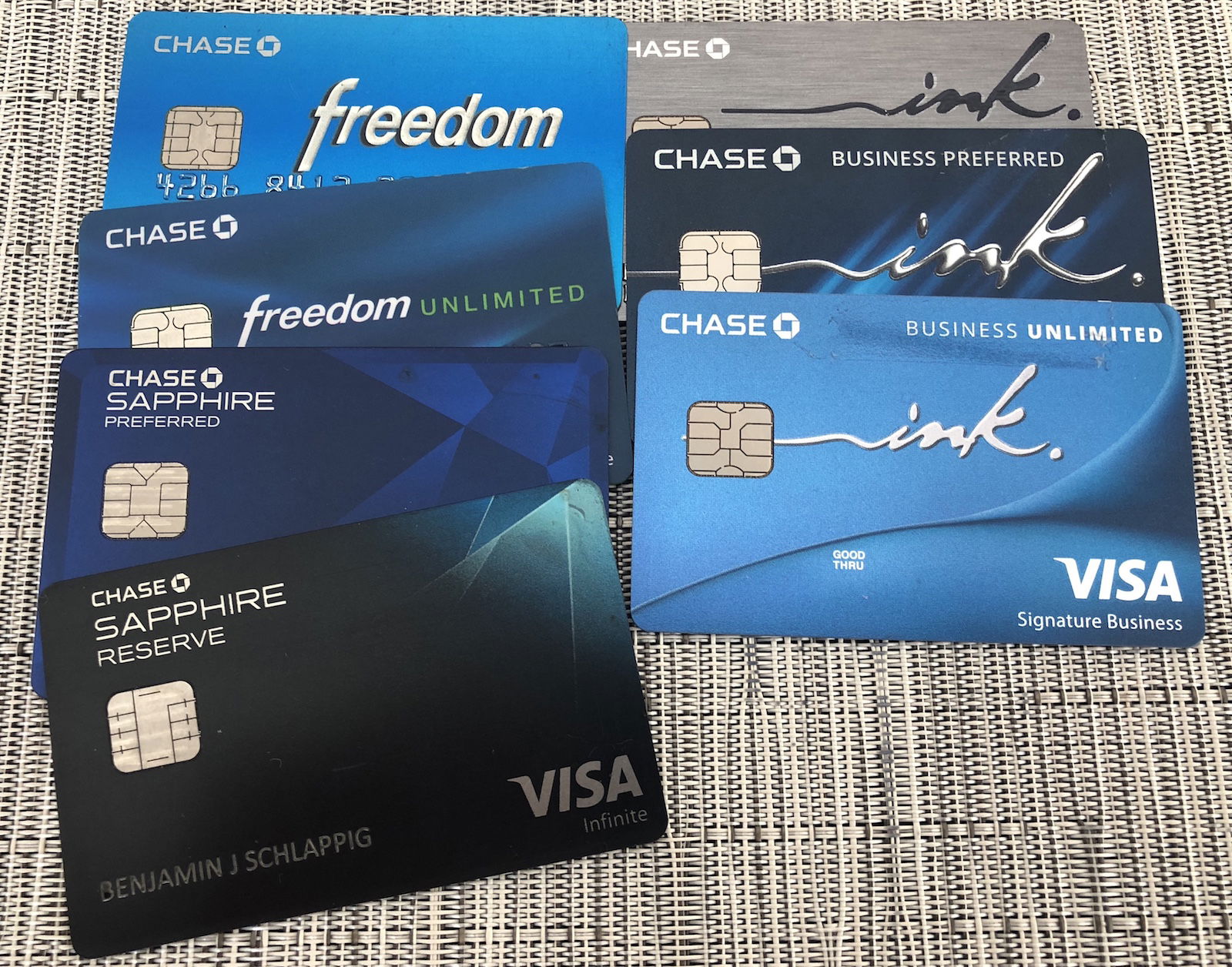A longtime reader sent me an email with a question that I figured it makes sense to address here, since I know many are probably in the same boat.
In this post:
How do you decide when to apply for more credit cards?
A reader in his mid-20s has an excellent credit score, and picked up the Chase Sapphire Reserve® Card (review) last year. He has over 100K Chase Ultimate Rewards points, which he wants to keep building up. He says he can basically get any card he wants, but he’s not sure where to go from here:
- He’s not a huge credit card spender, so realistically he’s not going to be splitting his spending between a dozen cards
- He’d like to take advantage of some of the great credit card bonuses out there, but also doesn’t want to open and close cards (understandably), and also doesn’t want to rack up too much in annual fees
With that out of the way, how do you decide whether to open a new card, and which offers to take advantage of?

My philosophy on building up a credit card portfolio
Let me start with an important warning — only apply for more credit cards if you can use them responsibly. If you’re going to end up overspending and financing charges, you’re unlikely to come out ahead. With that out of the way, I have two general thoughts if you’re in a situation where you have a good credit score but a limited number of credit cards.
First of all, when it comes to opening credit cards (and most things in life, for that matter), slow and steady wins the race. If you’re starting with just one credit card, I don’t recommend suddenly applying for 10 credit cards at once, because that has the potential to significantly impact your credit score. This is especially true early in your credit card journey, if you have just one or two cards.
Second of all, in the long run, having lots of credit cards can absolutely help your credit score. I have over two dozen credit cards, and my credit score is nearly prefect. You’ll want to be sure that you make your payments on-time, but beyond that, having more cards can help your credit score:
- Having more credit cards increases your total available credit, allowing you to potentially lower your credit utilization (the percentage of your available credit you use); this makes up 30% of your credit score
- Having more credit cards for a long time can help your average age of accounts, and for that matter the more cards you have, the less your average age of accounts is impacted by opening a new card; this makes up 15% of your credit score
The only other consideration is that applying for a credit card will get you an inquiry on your credit report, and that can temporarily ding your score by a few points. However, that shouldn’t be an issue in the long run.

How would I decide which cards to open?
If I had a great credit score but only one credit card and fairly limited credit history, I’d probably apply for one or two cards ASAP. I recommend doing this soon, because like I explained above, this will help further establish and stabilize your credit profile.
My focus wouldn’t necessarily be on getting the cards with the very biggest welcome offers, but rather my focus would be on getting cards where I see value, and that I could see myself holding onto long term. And if I wasn’t sure if I could get value from the cards long term, I’d probably consider a card where I know there’s a downgrade option after a year.
An ideal card could be one with strong ongoing perks that more than justify the annual fee, or it could be a no annual fee card, as it’s great to have cards you can hold onto for years and years at no cost, to help build your average age of accounts.
The way I see it, there are a few different strategies to take here…
Given that the reader already has the Chase Sapphire Reserve® Card, it could be worth picking up the no annual fee Chase Freedom Unlimited® (review). The card offers a minimum of 1.5x points on all purchases, so it’s one of the best cards for everyday spending. This could be a great card to hold onto long term to build the reader’s credit score, and could also help maximize spending to earn more Chase points.
Hotel credit cards are also easy to justify, in my opinion. For example, I’d consider picking up the $99 annual fee IHG One Rewards Premier Credit Card (review), which has a phenomenal welcome bonus, and offers an anniversary free night certificate, IHG One Rewards Platinum status, and much more. This should more than justify the annual fee on an ongoing basis, but if it doesn’t, it should be possible to downgrade to the no annual fee IHG One Rewards Traveler Credit Card (review).
I also think it’s good to diversify card issuers a bit, so if it were me, I’d consider picking up the duo of the $95 annual fee Citi Strata Premier℠ Card (review) and the no annual fee Citi Double Cash® Card (review). The two cards are excellent complements and have big bonuses.
You can even transfer Citi ThankYou points to some of the same partners as Chase Ultimate Rewards. If after a year you decide you don’t want to pay the annual fee on the Citi Premier Card, you have downgrade options.
There are obviously plenty of other options out there, but this is just an example of a few different directions you can go.

Bottom line
It’s exciting to have a great credit score and get approved for your first “big league” credit card. It can be tough to decide what to do from there, though, especially while trying to maintain (or even improve) your credit score.
Having more credit cards (and using them responsibly) can absolutely help your credit score over time, but I’d recommend taking a slow and steady approach. If I just had one or two cards, I’d recommend applying for one or two additional cards that you plan to keep in the long run. These could be no annual fee cards, or cards that offer perks that more than offset the annual fee.
Then see how things go — you’ll probably be pleasantly surprised by how your credit score and overall credit profile evolves, so hopefully after another six months or so you can pick up some more cards. But I think that’s a good start.
If anyone has similar experiences or tips, feel free to share them below!





Ha! Apply for a new card as soon as I meet the spend requirement for the most recent card.
But Good advice for someone starting out! I’m on the opposite end of the spectrum - old with lots of cards and great trips in the past and a few in the future already ticketed.
I took a break last year to get below 5/24; got the Sapphire then went crazy , almost a million points since then. But I’m now back on the “wagon”
Safe Travels
Plan for the new cc. When it's time to renew your insurance for example, get a card for the spend. That ensures you don't arbitrarily charge nonsense.
Amex's SUB offers have been so generous that I haven't put any spend on my Chase cards beyond the occasional CSR travel charges and Ink Cash Staple gc purchases. Chase notices that, correct? I'm 814 and have north of $300k of Chase credit between my 8 cards. I've been sticking with 40k referrals while I hit Amex hard.
Ben, thanks for this advice. I get a lot of questions from people whose interest is piqued when I describe all my free trips and who want to learn how to play the game. Henceforth, I will refer them to this post.
I used to adhere to the “slow and steady wins the race” philosophy. But not anymore. My new philosophy is back to my old college saying, “if you got ‘em, smoke ‘em!”
Too often deals dry up in this game. I’ve been at this for awhile and my experience is opposite of the advice I get from most bloggers.
As a result I am loaded up with millions of miles/points. Enough now to last me...
I used to adhere to the “slow and steady wins the race” philosophy. But not anymore. My new philosophy is back to my old college saying, “if you got ‘em, smoke ‘em!”
Too often deals dry up in this game. I’ve been at this for awhile and my experience is opposite of the advice I get from most bloggers.
As a result I am loaded up with millions of miles/points. Enough now to last me for 5 or 6 years of extensive international travel. I’m not trying to brag by saying this is there are many people who have this many miles and points. I’m just giving you an example of what’s possible if you go for the glory.
If slow and steady works for you, go for it, But you’re at risk of missing out on buckets of miles. I’ve been at this awhile and I only was shut down once by Chase but later reinstated.
I’m not saying you’re giving bad advice, as most are more comfortable with a slow and steady pace. But, as a famous rock musician said “It’s better to burn out than to fade away…”. Thank you Neil.
Tend to agree but what does this mean in practice? Open and closing accounts? What have you done that others might advise against?
Open as many accounts as I’m allowed. I let them step on the brakes but not me.
Yes, close the account when renewal fee is due unless I can negotiate a satisfactory bonus to keep it.
Plus I MS the crap out of bonus categories without fear of repercussions (even the Amex cards that everyone is so careful about).
There are more myths on these blogs than people know.
Much of...
Open as many accounts as I’m allowed. I let them step on the brakes but not me.
Yes, close the account when renewal fee is due unless I can negotiate a satisfactory bonus to keep it.
Plus I MS the crap out of bonus categories without fear of repercussions (even the Amex cards that everyone is so careful about).
There are more myths on these blogs than people know.
Much of the advice I read on these blogs do not jive with my extensive experience. I think a few anecdotes is sufficient to cause fear when they may not be the norm
But hey, let people do what they’re comfortable with.
Another thing I heartily disagree with if you do a lot of travel is This thing where they say don’t transfer points when bonuses are offered by AMEX, Chase, etc. unless you have an award in mind. I always transfer speculatively. I know I’ll use the points within a couple years and the risk of devaluation by 30% or so is worth the extra points I receive at the moment of transfer. I more regret having to transfer at a 1:1 ratio knowing I missed out on the bonus. But then I’m constantly generating more Amex and Chase points.
Maybe I should change my current blog to an “anti-travel advice” blog.
But the repercussions are terminating your points.
Depends what your income is and whether you are happy doing manufactured spend. I think Ben’s advice is entirely relevant for a young person starting out. Also your time is worth something and having multiple credit cards involves your time to keep track of them. I’d rather focus on investing in stocks as the return is greater on my time than just churning credit cards.